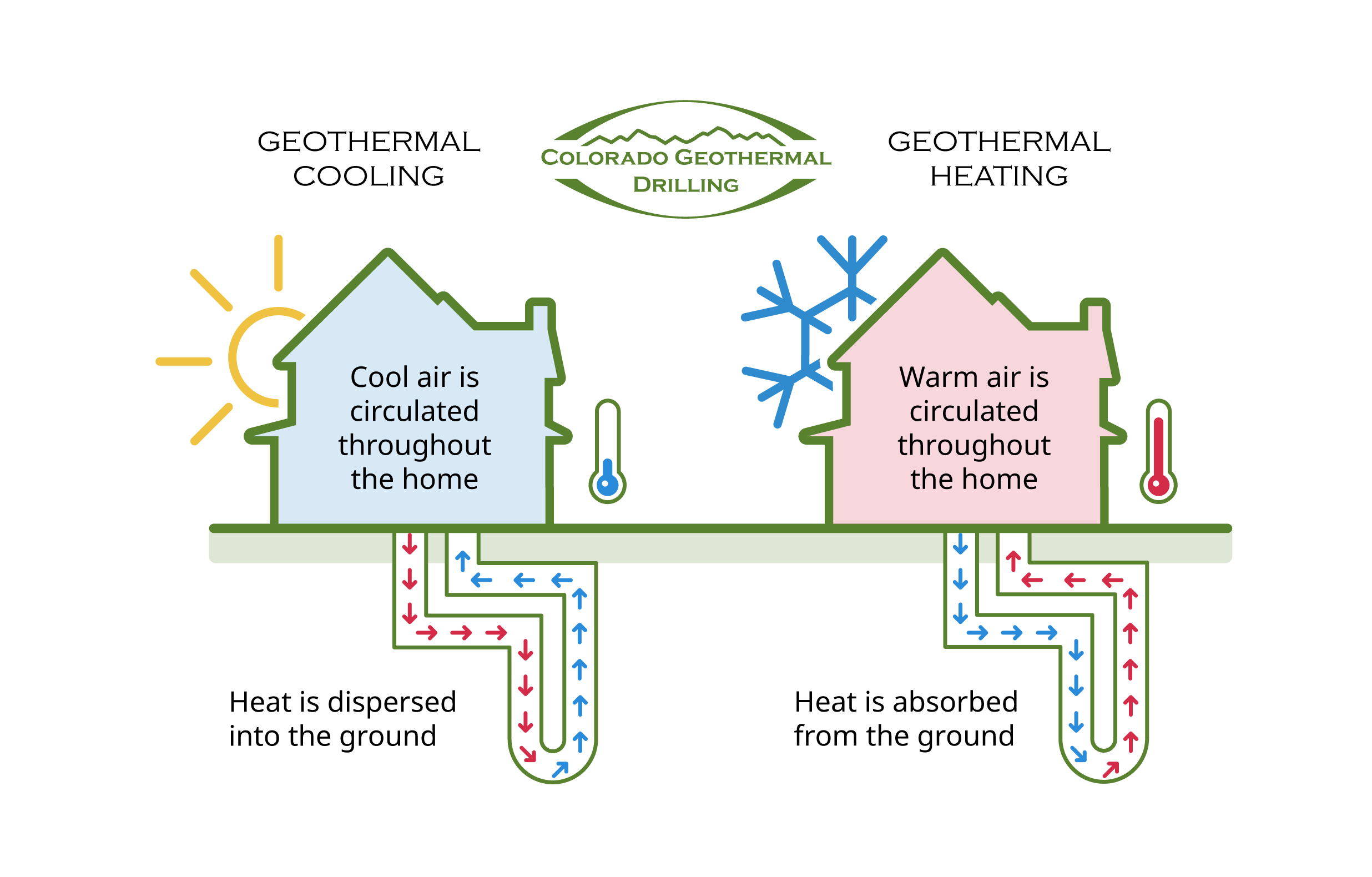What Is Geothermal?
Geothermal heating, also referred to as green heat, geoexchange, geothermal heat pumps (GHPs), ground-source heat pumps (GSHPs), and water source heat pumps is one of the most efficient ways to heat and cool a home. More and more homeowners are discovering the benefits of these systems, which tap the relatively constant temperature of the Earth. Simply put, in winter, warmth is drawn from the earth through a series of pipes, called a loop, installed beneath the ground. A water solution circulates through the loop and carries the earth's natural warmth (in Colorado the earth stays at a relatively constant temperature of approximately 48-55 degrees) to a heat pump inside the home. The heat pump concentrates the earth's thermal energy and transfers it to air circulated through interior ductwork or to radiant heat in flooring.
In the summer, the process is reversed; heat is extracted from air inside the home and transferred to the biggest "heat sink" of all- Earth - by way of geothermal loops.

Learn more about Gethermal Energy
What Are The Major Benefits To Installing Geothermal?
The biggest benefit of geothermal is that it uses 25%-50% less electricity than conventional heating or cooling systems. This translates into a geothermal heat pump using one unit of electricity to move three units of heat from the earth and saving owners 25% to 70% on their utility bill. According to the EPA, geothermal heat pumps can reduce energy consumption - and corresponding emissions - up to 44% compared to air-source heat pumps and up to 72% compared to electric resistance heating with standard air-conditioning equipment. Geothermal heat pumps also improve humidity control by maintaining about 50% relative indoor humidity, making geothermal very effective in humid areas.
Learn more about Gethermal Benefits
What Are The Environmental Advantages Of Geothermal?
According to the U.S. Department of Energy (DOE) Office of Geothermal Technologies, nearly 40% of all U.S. emissions of carbon dioxide (CO2) are the result of using energy to heat, cool and provide hot water for buildings. This is about the same amount of CO2 contributed by the transportation sector.
Currently installed systems are making a huge difference in our environment! Geothermal systems are eliminating more than three million tons of carbon dioxide and are equivalent of taking 650,000 automobiles off the road. Geothermal systems conserve energy and, because they move heat that already exists rather than burning something to create heat, they reduce the amount of toxic emissions in the atmosphere. They use renewable energy from the sun, and because the system doesn't rely on outside air, it keeps the air inside of buildings cleaner and free from pollens, outdoor pollutants, mold spores, and other allergens.
How Much Will A Geothermal System Cost To Install?
The costs associated with installation have a wide range based on a number of factors, such as the structure's size and design, type of construction, location, etc. so it is impossible to provide a number here. However the amount geothermal saves the owner every month in energy costs is more than enough to offset the higher installation cost.
How Long Will It Take For My System To Pay For Itself?
This answer is based on what it would cost you to operate another heating and cooling system as compared to how much your bills will be lowered operating a geothermal system. We can provide you with an energy analysis which will show the cost of operating a geothermal system as compared to a conventional system and how long it will take for the savings to cover the cost of the system completely. With natural gas users we typically see a payback of approximately 5-10 years and with propane we are seeing as quickly as 2-5 years!
What Size System Will I Need?
We recommend that if you are strongly considering going with a geothermal system, you should have a heat load calculation done on your home. This gives us the information we need to properly size your geothermal system and give you the most efficient system to meet your needs.
